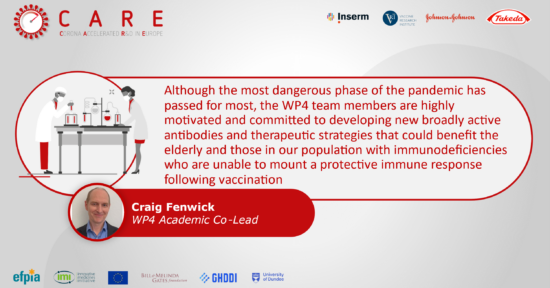February 1st 2024
The faces behind the CARE work-packages – Craig Fenwick, WP4 academic Lead
The faces behind the CARE work-packages – Craig Fenwick, WP4 academic Lead
CARE (Corona Accelerated R&D in Europe) is the largest European research initiative addressing the challenges of COVID-19. It is no surprise that it is designed in a comprehensive, yet agile, structure to fulfill the 38 partners’ shared key goals: (1) to identify therapeutics for the current pandemic, (2) to identify antiviral therapies for future outbreaks and (3) to increase the understanding of the pathophysiology of COVID-19. In a set-up of eight work-packages (WPs), the scientists and management at CARE carry out the project activities that have so far resulted in valuable learnings about the COVID-19 and how it might be defeated.
Over the course of the project, we have seen some changes in the leadership of the eight work packages, and will once again go behind the scenes through brief interviews with our newest work package leaders to hear insights on what makes their work so special, as well as their challenges and hopes.

WP4 – Generation and characterization of monoclonal antibodies against SARS-CoV-2 and related coronaviruses
The CARE work-package 4 (WP4) focuses on the generation and characterization of monoclonal antibodies against SARS-CoV-2 and related coronavirus. The EFPIA Lead of WP4, Craig Fenwick (Centre Hospitalier Universitaire Vaudois) shares his views on the work in WP4 of the CARE project.
What makes the work for CARE special for you and your WP team?
The interdisciplinary team of highly talented members makes it a pleasure to work with partners in industry and academia to combat this ever-evolving and important infectious disease that brought the world to a standstill. Although the most dangerous phase of the pandemic has passed for most, the WP4 team members are highly motivated and committed to developing new broadly active antibodies and therapeutic strategies that could benefit the elderly and those in our population with immunodeficiencies who are unable to mount a protective immune response following vaccination. These at-risk individuals may have primary hereditary immunodeficiencies or secondary immunodeficiencies resulting from external factors that compromise the immune response, including the use of immunosuppressive medications by individuals including organ transplant recipients, infections by certain viruses, or specific cancer therapies. These antibodies may also serve as a preparedness therapeutic against a future coronavirus outbreak with pandemic potential.
What are or were the biggest challenges within WP4? (and how did you overcome them?)
The greatest challenge that we and others have faced in the discovery of anti-COVID therapeutic antibodies has been the rapid evolution of the virus toward more infectious and immune response evading variants. Potent antibodies active against all circulating viruses at the time have been discovered by our groups on several occasions, only to have their neutralizing effect abolished by the next emerging variant. We are overcoming these challenges by identifying highly rare antibodies that bind to conserved regions of the virus that can’t easily mutate to evade neutralization without compromising the fitness of the virus, making it poorly transmissible from person to person.
What have you personally learned so far through the experience of working in CARE?
The urgency of the pandemic really galvanized the team into a highly collaborative and supportive network where we considered all the necessary milestones between basic research, discovery and preclinical profiling to move promising candidates forward quickly and as efficiently as possible. Many of the different team members contributed to minimizing the various bottlenecks in the research to have the best possible chance of success.
